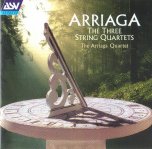The “Spanish Mozart”, Crisóstomo Jacobo Antonio de Arriaga, was born in Bilbao in January, 1806, exactly half a century after Mozart himself. He died at 19 and was already famous throughout Europe; but today very little of Arriaga’s music is performed. Remarkably, this is the second survey of Arriaga’s three string quartets to have appeared in the last few months. Previously on MDG, we heard a tonally impoverished, unsympathetic traversal by the Romanian Voces Quartet. If you hadn’t come across this music before, those performances would have done little to alert you to its importance, but now the cycle has been accorded recordings of the quality it truly deserves. The new disc (all three works fit comfortably onto a single CD) features the Arriaga Quartet, a Belgian group led by ASV’s solo violinist Michael Guttman.
These are lively, adroit accounts. In the D minor quartet the players constantly draw attention to the many external similarities between this work and Mozart’s in the same key–K 421. You feel this particularly in the first movement as the first violin leads a lengthy discussion of the opening idea. The adagio brings excellently played solos from the violist, but best of all is the angular, agitated rondo finale, whose “Sturm und Drang” urgency is plainly derived from Mozart. It would be hard to contemplate a greater contrast between this music and the racy conclusion of the A major quartet, which has an exuberance that wouldn’t be out of place in a Rossini opera!
The last work, the quartet in E-flat, is the best balanced and most interesting of the three. Its juxtaposition of styles, from the angular, virtually monothematic first movement, through a slow movement that’s sometimes almost prophetic of Berlioz, to its extraordinary finale, shows Arriaga as a fascinating polymath. The last movement is an assured sonata-form study, with highly contrasted first and second themes and a “sting-in-the-tail” ending that makes an unexpectedly tragic conclusion to a work allegedly in a major key. Detailed and well-balanced sound complements and completes this excellently performed and beautifully presented package that goes far to redress the long neglect of these fine quartets.
































